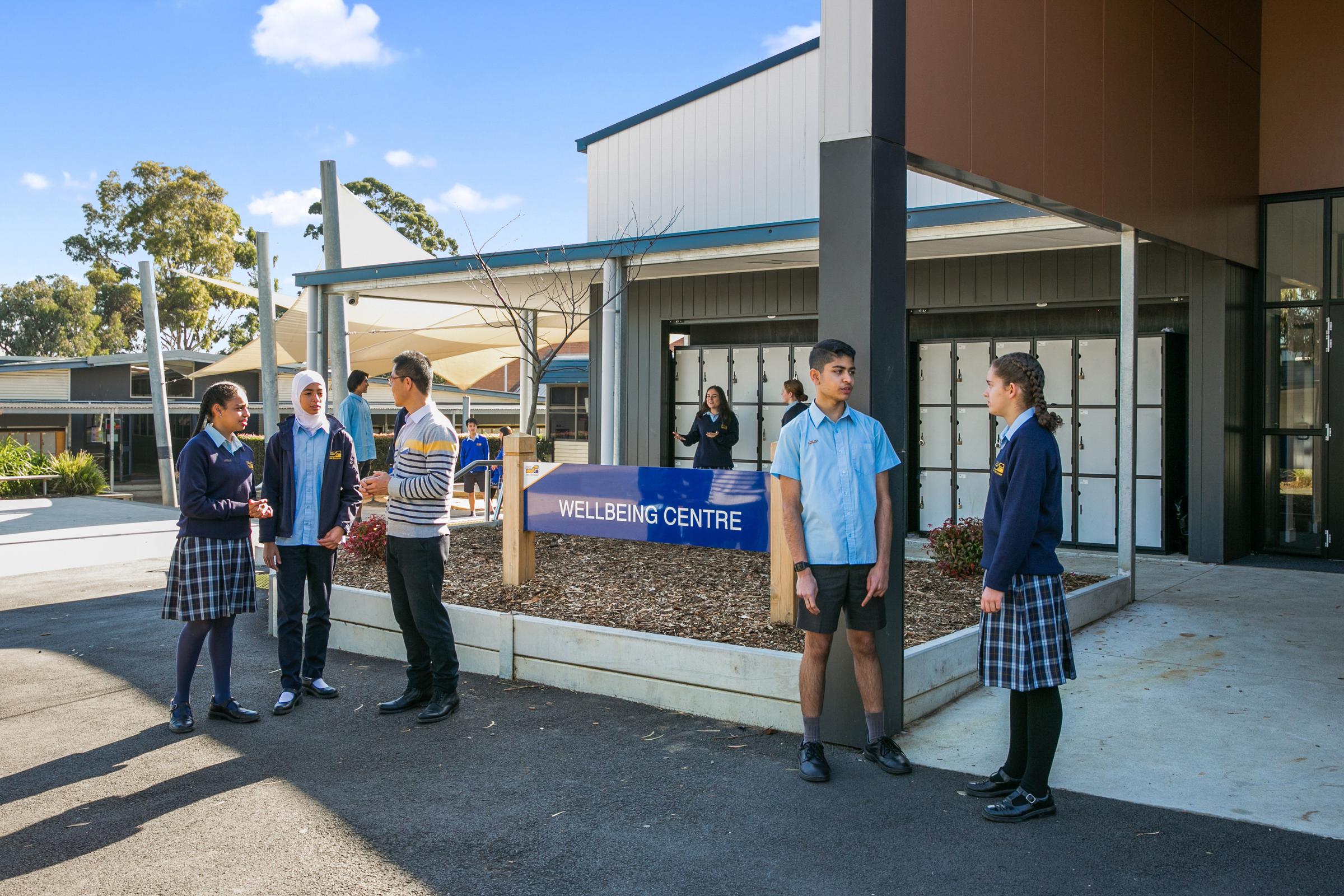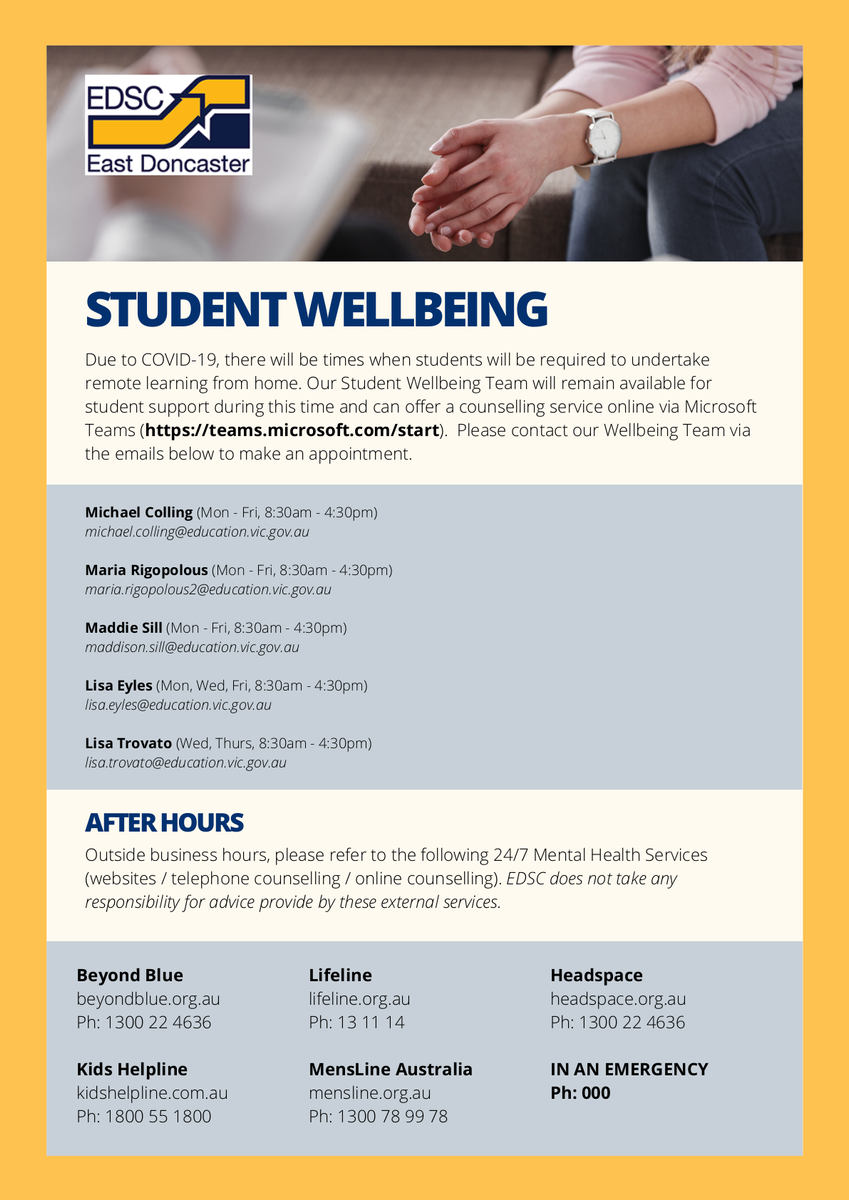
Student Wellbeing News
Career planning and transition for young people on the autism spectrum webinar
Career planning and transition for young people on the autism spectrum Thursday 2nd September, 4.00pm (AEST) for parents and carers.
- In this 60 minute live and interactive webinar, our presenters, Associate Professor Marina Ciccarelli, Cheryl Mangan, and Brendan James will provide information for parents about:
- The Better OutcOmes and Successful Transitions for Autism (BOOST-A) research;
- The role of parents and supporters in youth focused, strengths-based career planning; and
- How myWAY Employability career planner can support young people on the autism spectrum to build a customised profile and goals to plan for future career pathways.
Based on six years of research, myWAY Employability is a smart web platform that helps autistic individuals plan and prepare for working life. Autistic individuals co-produced content, design, and usability of the website. myWAY Employability matches an individual’s interests and strengths to relevant careers and pathways. It encourages users to create big dreams, and smaller goals and tasks to track progress.
To register click below:
Lisa Trovato
Wellbeing Coordinator
The Importance of Peer Study Groups
When I was in Year 8, way back in 1992(!!!), I remember spending many weekends at my best mate’s (another Michael) house. Michael had an older brother, Anthony, who was in Year 12 and right in the middle of his VCE studies. It was through observing Michael’s older brother, Anthony and his mates on those weekends that, not only helped set me up for my own VCE a number of years later, but it has also gone on to help so many others over the years, particularly last year with the Year 12s I was working with, during lockdown.
I would watch Anthony’s friends descend upon their family home on a Friday night, where they’d get take away pizza and watch Seinfeld episodes on the TV, with lots of great conversation and a lot of laughter coming from the lounge room, where they’d also set up their sleeping bags on the floor for the night. On a Saturday morning however, I’d wander into the lounge room to find them all sitting around a large table, notebooks out and heads buried in books. Michael and Anthony’s Mum would be in the kitchen cooking up a breakfast of champions for them, which they’d all take a break to eat, before returning to what would be a productive weekend of study; peers helping and supporting one another to learn and get the best out of one another in terms of their self-directed learning.
COVID-19 lockdowns would have appeared to have robbed us of these opportunities – but this is indeed not the case. Last year, I shared this story with all the Year 12s I was working with, who were all struggling with the lack of social interaction with their peers in such a critical year, and, were struggling with finding the motivation to study and stay focused during lockdown. I made the suggestion that they get some small study groups happening, the same as Anthony all those years earlier, but this time, online. I suggested they do the same thing; get together on MS Teams, or Zoom, etc., have dinner and a laugh with their mates, and then get stuck into their studies.
I didn’t expect it to have the positive outcomes it did, but so many of the Year 12s who did this, found it was the one thing that helped them get through a difficult few months under Stage 4 restrictions, and, get the most out of themselves with their learning. I have made this same suggestion to many of the Senior Students I am currently working with, much to the hesitation of some parents who feel that social opportunities should be limited, if not cancelled all together in Year 12. This is not the case and couldn’t be further from what is needed. Students need balance! Students need a healthy amount of social interaction with one another and the opportunity to learn much needed peer-engaged study; which is exactly what is required of them if they are to head into tertiary studies next year. One student told me recently that is only because of the fact he did get an online study group happening, that he did above and beyond what he thought he would do on his recent UCAT exam.
I celebrated my 43rd Birthday on Sunday and it was so good to be able to still see all my loved ones on the screen whilst we did the Birthday cake at home. From my parents and my sister and her family with their newborn baby only a few suburbs away, to my brother who dialled in from London. It was a very special day, albeit unconventional. COVID-19 and the lockdowns may have changed things for now, but it will pass. We still need to stay socially connected. We’d love to see some online study groups popping up right across the EDSC community, from Year 7 to 12, so please give this a go and see how you can make it work for you and your friends!
Michael Colling
Director of Wellbeing
michael.colling@education.vic.gov.au
同伴学习小组的重要性
1992年,当我八岁的时候,我记得我在我最好的朋友家(他也叫Michael)度过了很多个周末。Michael 有一个叫Anthony的哥哥。他当时上12年级,正在学习VCE。观察Michael的哥哥Anthony和他的朋友在那些周末如何学习,不仅帮我为之后几年的VCE做好了准备,而且还在之后的很多年帮助了很多其他学生,尤其是那些在去年封城期间,我负责的12年级的学生们。
那段时光,我会观察到Anthony的朋友们会在周五晚上带着打包的披萨来到Anthony和Michael的家;他们会一起看《宋飞转》。我时不时能听见从客厅传来他们愉快的对话和笑声;他们还会在地板上铺好睡袋为晚上睡觉做准备。然而到了周六早上,我闲逛到客厅的时候,我发现他们都围坐在一张大桌子旁,拿出笔记本,然后所有人都在奋笔疾书,努力学习。Michael和Anthony的妈妈会在厨房为他们做一顿丰盛的早餐,以便他们之后在回到紧张的周末学习之前休息一会儿的时候吃。同伴之间的帮助和支持在他们自己主导的学习中创造出了最好的效果。
新冠病毒疫情导致的封城可能看上去剥夺了我们同伴学习小组学习的机会,但是并不完全是那样。去年,我和所有我负责的12年级学生分享了上面提到的故事。他们都因为在如此关键的一年缺乏社交互动而困苦不堪;他们都缺乏动力学习而且很难在封城期间保持精神集中。我当时建议他们组成一些像当年的Anthony一样的同伴学习小组,不过这次,当然是以在线为形式。我建议他们同样在MS Teams或Zoom上做Anthony当年做过的事:一起在网上吃晚饭,和朋友说说笑笑,然后一起专心学习。
我一开始没料到在线同伴学习小组可以带来如此积极的结果,但是很多参与其中的12年级学生发现正是在线同伴学习小组帮助他们度过长达几个月第四级别封城的艰难时光,而且让他们达到了最好的学习状态。我已经对我目前负责的很多高年级学生做了同样的建议,但是一些相信高年级学生的社交频率应该被大大限制甚至12年级的应该被全部取消的家长对此表示犹豫。我认为那样做是不对的而且完全没有必要。学生需要劳逸结合!学生需要适度地彼此社交互动以及有同伴参与学习的机会,这些都是他们下一年步入高等教育后所要求具备的能力。一个学生告诉我最近正式因为他参加了在线同伴学习小组,他才能在最近的UCAT考试中超水平发挥。
我昨天庆祝了自己43岁生日,能在家吃蛋糕的同时还能在屏幕上看到我所爱的人们——从离我家只有几个郊区距离的我的父母和妹妹、以及她的家人和她刚出生的宝宝,到从伦敦打电话回来的我的弟弟,那真是太好了。尽管昨天不同以往,但是是特别的一天。新冠疫情和封城可能现在会改变许多事情,但是它们终会过去。我们仍然需要保持社交关系。我们很乐意看到一些7年级到12年级的同伴学习小组在EDSC社区中涌现,因此请尝试一下,然后看看它怎么为你和你的朋友们所用。
Michael Colling:East Doncaster中学的健康主任。
电子邮件:michael.colling@education.vic.gov.au
Wellbeing Staff
For more information about Wellbeing at the College, please visit the following link ..
Child Safety Standards
East Doncaster Secondary College is committed to the safety and wellbeing of all children and young people. This will be the primary focus of our care and decision making.
East Doncaster Secondary College has zero tolerance for child abuse.
East Doncaster Secondary College is committed to providing a child safe environment where children and young people are safe and feel safe, and their voices are heard about decisions that affect their lives. Particular attention will be paid to the cultural safety of Aboriginal children and children from culturally and/or linguistically diverse backgrounds, as well as the safety of children with a disability.
Every person involved in East Doncaster Secondary College has a responsibility to understand the important and specific role he/she plays individually and collectively to ensure that the wellbeing and safety of all children and young people is at the forefront of all they do and every decision they make.
In our planning, decision making and operations, all personnel at East Doncaster Secondary College will;
- Take a preventative, proactive and participatory approach to child safety;
- Value and empower children to participate in decisions which affect their lives;
- Foster a culture of openness that supports all persons to safely disclose risks of harm to children
- Respect diversity in cultures and child rearing practices while keeping child safety paramount;
- Provide written guidance on appropriate conduct and behaviour towards children;
- Engage only the most suitable people to work with children and have high quality staff and volunteer supervision and professional development;
- Ensure children know who to talk with if they are worried or are feeling unsafe, and that they are comfortable and encouraged to raise such issues;
- Report suspected abuse, neglect or mistreatment promptly to the appropriate authorities;
- Share information appropriately and lawfully with other organisations where the safety and wellbeing of children is at risk; and
- Value the input of and communicate regularly with families and carers.







